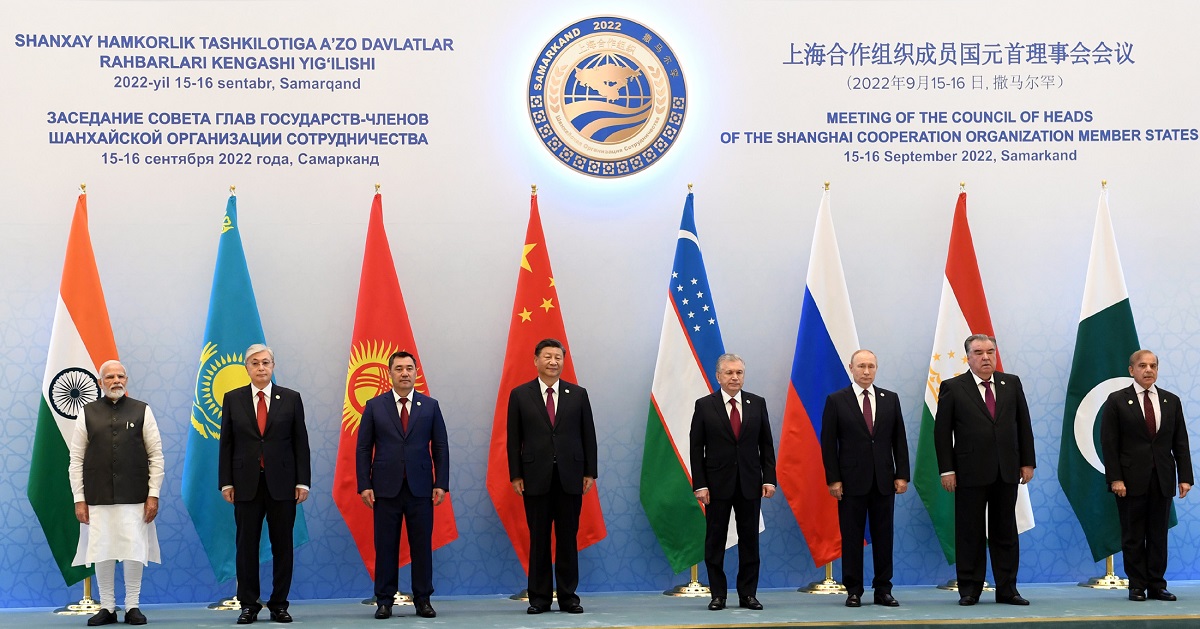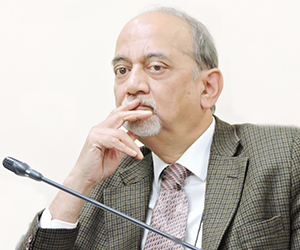Prime Minister Modi visited Samarkand to take part in the 22nd Summit of the Shanghai Cooperation Organisation on 15-16th September 2022. He also had bilateral meetings with Uzbek President Shavkat Mirziyoyev President Putin of Russia, President Ebrahim Raisi of Iran, and President Recep Tayyip Erdoğan of Turkey. The meeting came against the background of the continuing war in Ukraine and tensions in the Taiwan Strait. The Samarkand Declaration[1] adopted at the conclusion of the SCO Summit touched upon a wide range of political and economic issues. Of particular interest to India are Afghanistan, terrorism, and connectivity issues.
India has historical links with this region. Even before the advent of Islam, this was connected with India by Uttarapath. The ancient name of Bokhara in Uzbekistan was Vihara; there are ruins of Buddhist Vihar on the outskirts of the city. This was also the region from where Moguls came. In the 19th century, this was the scene of rivalry between the Russian and British empires. Today, China is trying to consolidate its influence in the region. Prime Minister Modi visited the Central Asian Republics in 2016.
Prime Minister Modi in a bilateral meeting with President Putin called for an end to the Ukraine war. He reiterated his call for early cessation of hostilities and the need for dialogue and diplomacy. He also said that Putin has to take the initiative in this regard. French President Macron in his address at the UN General Assembly on 21st September[2] referred to PM Modi’s statement that ‘today’s era is not one for war’.
The Samarkand Declaration discussed the Afghanistan situation but made no reference to the Taliban. This shows that the SCO leaders do not want to recognize the Taliban regime. The declaration mentioned support for ‘the establishment of Afghanistan as an independent, neutral, united, democratic and peaceful State, free of terrorism, war, and drugs ’. It stated that it is ‘critical to have an inclusive Government in Afghanistan, with representatives from all ethnic, religious and political groups of Afghan society ’. Obviously, the Taliban do not fulfill this criterion. Did Pakistan press the issue? If not, their silence would provide an index of the relations of the Taliban regime with Islamabad which are not particularly happy at the moment. The Taliban have accused Islamabad of having provided access to the drone, which attacked and killed Zawahiri, though they have not accepted that the Al-Qaeda leader was living in Kabul. There have been fresh incidents of killings by TTP in Swat. Afghan Taliban’s refusal to distance themselves from TTP is an area of contention between Pakistan and the Kabul regime.
The Declaration mentioned that the ‘Member States expressed deep concern over the security threat posed by terrorism, separatism, and extremism in all its forms and manifestations and strongly condemned terrorist acts around the world.’ The Declaration added that member states ‘seek consensus on the adoption of a Comprehensive Convention on Combating International Terrorism ’. The author of this article had the privilege of drafting the CCIT (Comprehensive Convention on International Terrorism) and obtaining negotiating mandate from the UN General Assembly.
China wants a strong consensus on ‘terrorism, separatism, and extremism’, so far as they impinge on its interests. It has been carrying out a campaign for the suppression of Uighur Muslims. However, it continues to drag its feet on designating Pakistan-supported supported terrorist groups in the UN. The SCO language on CCIT continues to be ambivalent. The reference to ‘seeking’ consensus suggests that it does not exist yet, and in the future, no action can be taken on the basis of a vote in the UN General Assembly.
Samarkand Declaration emphasized connectivity. This issue is also important for us. At present, our trade and economic cooperation in the region is rather limited. This requires developing International North-South Transit Corridor (INSTC) as well as accelerating the pace of work on Chabahar port.
Afghanistan and connectivity issues also came up for discussion in PM’s bilateral meeting with President Raisi in Samarkand. PM also discussed with him the development of the Shahid Beheshti terminal in Chabahar port as well as improving regional connectivity.
The Samarkand Declaration has endorsed the Iranian position on the nuclear deal. It called for ‘sustained implementation of the Joint Comprehensive Plan of Action on the Iranian nuclear program’. It also called for effective implementation of their commitments under the nuclear accord by all parties ‘in accordance with the UN Security Council resolution 2231’. The resolution was adopted to approve the nuclear deal (JCPOA). Both these formulations suggest that what remains to be done is the implementation, not the re-negotiation of the existing deal. The EU is also supporting the revival of JCPOA.
On global issues, SCO presents an alternative to western positions. The Samarkand Declaration called for respect for the ‘right of peoples to independently and democratically choose their political and socio-economic development’. It also stressed respect for sovereignty, independence, territorial integrity of States, and non-interference in internal affairs.
Samarkand Declaration also stressed that ‘unilateral application of economic sanctions other than those adopted by the UNSC is inconsistent with the principles of international law and adversely affects third countries and international economic relations’. In the immediate context, this is of interest to Russia. However, this could be of greater concern to China, which enjoys a trade surplus with the US and EU markets. Its future prosperity depends upon continued access to these economies unhindered by sanctions.
The declaration also contained a reference to the missile defense issue. It mentioned the ‘negative impact of unilateral and unrestricted build-ups of global missile defense systems by individual countries or groups of States on international security and stability ’. This may reflect the Russian position that the deployment of missile defense systems by the USA is a breach of the ABM Treaty.
The Samarkand Declaration[3] was silent on the ongoing Ukraine crisis. It did not mention the recent crisis in the Taiwan Strait either. Their omission may not necessarily mean that they were outside the scope of SCO. The Declaration covered international issues and included references to Iran and Afghanistan both of whom are outside Central Asia. It may be worth recalling that in the vote on the Ukraine issue in the General Assembly, Kazakhstan, Kyrgyzstan, and Tajikistan abstained, while Turkmenistan and Uzbekistan were absent. Support for the Chinese position on Taiwan remains untested.
The Chinese President visited Kazakhstan on his way to SCO Summit in Samarkand. He expressed support for Kazakhstan’s “independence, sovereignty and territorial integrity’.[4] He also added China would “categorically oppose the interference of any force in the internal affairs of your country.’ [5] Kazakhstan is a member of the Russian-led security organization (CSTO). The statement shows that China has started assuming a political role even within the space where historically Russia has enjoyed a leading position. There have always been strands of cooperation and competition between the two. The two structures for security and economic cooperation created by Russia - CSTO (Collective Security Treaty Organisation) and Eurasian Economic Union (EEU), do not include China. This time Samarkand Declaration included an exhortation to link the EEU and OBOR.
In the future, Chinese influence in Central Asia is going to increase if the present confrontation between Russia and the West continues. It has already moved into the security area. It conducted military drills in Tajikistan in 2017 as part of a counter-terrorism exercise. China has a very formidable position in trade and economic cooperation. It has invested heavily in building a pipeline network to bring oil and gas from Russia, Kazakhstan, Uzbekistan, and Turkmenistan to China. It has also acquired stakes in upstream oil and gas extraction. From the perspective of Central Asian Republics, they have no option unless there are pipelines to bring their oil and gas to other markets. If the Iran nuclear deal is revived, this will open the way to bring oil and gas from Central Asia to India via Iran. Iran itself has the second-largest gas reserve in the world.
PM Modi in his remarks at Samarkand mentioned ‘The pandemic and the crisis in Ukraine caused many obstacles in global supply chains, due to which the whole world is facing an unprecedented energy and food crisis. He also called for ‘ensuring the food security of our citizens. One possible solution to this problem is to promote the cultivation and consumption of millets.’[6] The crude oil prices have come down from a high of $ 130 per barrel after the Ukraine crisis erupted to around $ 92 per barrel now. But they are still 23 % higher compared to prices a year ago. Brent crude price has gone up from $ 73.57 to $ 90.52 on 20th September during this period[7]. Gas prices in Europe are still more than seven times above the average for this time of the year.[8] The wheat price has gone up by more than 60 % from $ 260 per ton to $ 420 per ton in one year.
SCO is expanding its footprints. SCO’s foundation was laid with the adoption of the Declaration of the Shanghai-5 in 1996. The Shanghai Cooperation Organisation (SCO) was set up 5 years later in 2001. It adopted its Charter in July 2002. Since then, its membership has grown to 8 countries: China, Russia, Uzbekistan, Kazakhstan, Kyrgyzstan, Tajikistan, India, and Pakistan. A memorandum has been signed approving Iran’s membership. Bahrain, Maldives, Kuwait, UAE, and Myanmar have been accepted as dialogue partners. There is also an agreement to grant similar status to Egypt, Saudi Arabia, and Qatar. India will assume Presidency next year.
Endnotes :
[1]Samarkand Declaration of the Council of the Heads of States of Shanghai Cooperation Organisation, Ministry of External Affairs, https://www.mea.gov.in/bilateral
[2]General Debate of the 77th session of the UN General Assembly, https://gadebate.un.org/en
[3]Samarkand Declaration of the Council of the Heads of States of Shanghai Cooperation Organisation, Ministry of External Affairs, https://www.mea.gov.in/bilateral
[4]Wall Street Journal, The SCO’s Clumsy Push to Disrupt the World Order by Walter Russell Mead, September 19 2022
[5]Ibid
[6]PM’s remarks at SCO Summit in Samarkand, https://www.narendramodi.in/prime-minister-narendra-modi-s-remarks-at-sco-summit-in-samarkand-uzbekistan-564434
[7]Oil Price, 20.9.2022
[8]Bloomberg, Europe Gas Prices Drop as Nations Ramp Up Efforts to Ease Crisis, 19 September 2022
(The paper is the author’s individual scholastic articulation. The author certifies that the article/paper is original in content, unpublished and it has not been submitted for publication/web upload elsewhere, and that the facts and figures quoted are duly referenced, as needed, and are believed to be correct). (The paper does not necessarily represent the organisational stance... More >>
Image Source: https://www.pmindia.gov.in/wp-content/uploads/2022/09/H20220916117583.jpg










Post new comment